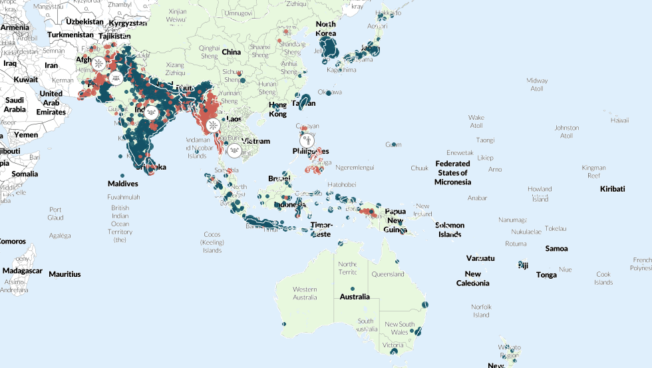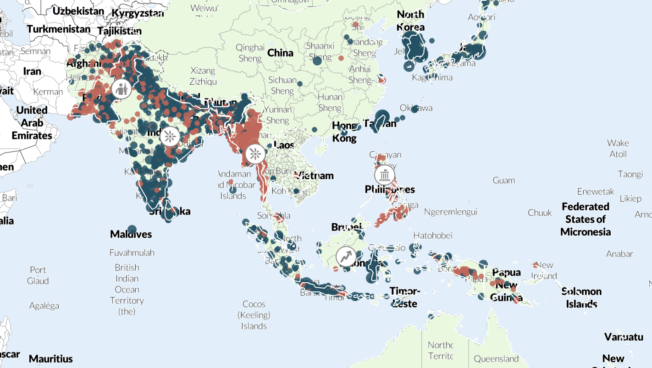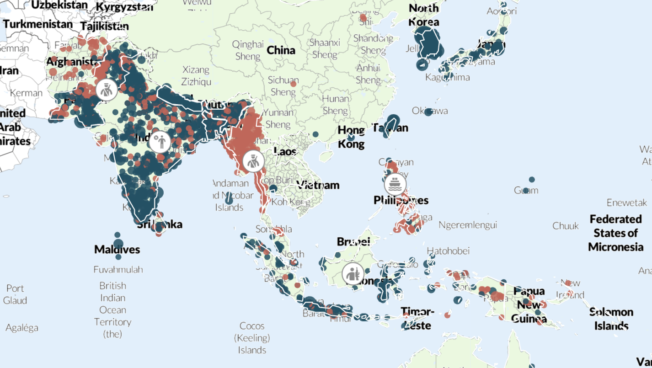Regional Overview
Asia-Pacific
April 2024
Posted: 9 May 2024
 India: General elections underway amid ethnic and militant violence
India: General elections underway amid ethnic and militant violence
The 18th Indian general elections started in April, and two out of the scheduled seven phases of polling were completed on 19 and 26 April. The elections will continue until 1 June, with the results set to be declared on 4 June.1The Hindu, ‘2024 Lok Sabha elections to be held in 7 phases from April 19, results on June 4,’ 16 March 2024 Amid the elections, there was an approximately 34% increase in political violence across the country in April compared to the month prior, including increases in the restive Manipur state and the Jammu and Kashmir Union Territory. Meanwhile, security forces intensified their crackdown on Naxal-Maoist rebels as several states in the ‘Red Corridor,’ the epicenter of the Naxal-Maoist insurgency, went to the polls. At least 29 Naxal-Maoist rebels were reportedly killed during a counter-insurgency operation in Chhattisgarh state on 16 April, marking the deadliest clash between Naxal-Maoist rebels and state forces in three years.
In Manipur, videos showing the mutilated bodies of two Kuki assailants, reportedly killed during a clash between the Meitei and Kuki communities in Kangpokpi district, were widely circulated on social media, further escalating ongoing inter-ethnic tension amid the elections.2Scroll (India), ‘Two Kuki-Zo “village volunteers” gunned down in Manipur, bodies mutilated,’ 14 April 2024 Meanwhile, re-polling was organized in several polling locations amid claims of armed assailants, including those from the Meitei militia Arambai Tenggol, intimidating and attacking voters and opposition supporters, mainly from the Indian National Congress.3Associated Press, ‘Some voters in northeast India go back to the polls after violence disrupts first day of election,’ 22 April 2024
In Jammu and Kashmir, where voting for its five constituencies has been spread over five phases due to security concerns,4Deccan Herald, ‘Lok Sabha polls 2024: Jammu and Kashmir to vote in five phases,’ 20 March 2024 armed clashes between security forces and militants increased in April to eight events, up from four in March. Escalating clashes come against the backdrop of a fresh spate of targeted attacks by militants against nonlocal migrant workers and government officials, resulting in at least two reported fatalities in April. Attacks against migrant workers have been a growing concern in Kashmir since the abrogation of Article 370 in 2019, which ended special protections for locals with regard to jobs and land ownership. Many in Kashmir fear that the government, led by the Hindu nationalist Bharatiya Janata Party, aims to change the demographics of India’s only Muslim-majority region.5Rifat Fareed, ‘Kashmir migrant workers flee amid rise in suspected rebel attacks,’ Al Jazeera, 19 October 2021
For more on the unrest around the 2024 Indian elections, see ACLED’s Special Election Series on India.
 Indonesia: Intensified conflict in Papua puts civilians at risk
Indonesia: Intensified conflict in Papua puts civilians at risk
The conflict between Indonesian security forces and the West Papua National Liberation Army (TPNPB) intensified in April, endangering civilians’ safety in the Highland and Central Papua provinces. In Yokatapa village, Intan Jaya, one child was killed and another seriously injured when they were caught in the crossfire between police and the TPNPB, which was trying to free a detained member of the group. In Highland Papua, the rebels killed the son of a Papuan village head and a non-Papuan local public servant. Both were accused of being spies for the Indonesian authorities.6Dhani Irawan, ‘TPNPB shot the son of the Pegunungan Bintang village head and two resident of Puncak Papua,’ Detik, 9 April 2024; Tribunnews, ‘Toraja people mourned again, Yosep Pulung stabbed to death by TPNPB in Yahukimo Papua,’ 4 April 2024 ACLED records 11 reported fatalities in April in events involving the TPNPB, compared with six during the previous month. Civilian deaths contributed to at least four of the fatalities. Amid the increase in violence, the Indonesian military forces announced they would return to using the term OPM (‘Free Papua Movement’) to describe the TPNPB, rather than KKB (‘Armed Criminal Group’). The military has changed the way it categorizes the TPNPB several times, with this most recent change emphasizing its view that the TPNPB is an enemy made up of soldiers or combatants. The change alters the group’s status under humanitarian law, leading to less legal oversight of military operations against the TPNPB.7BBC Indonesia, ‘TNI uses the term OPM again, Polri still calls it KKB – ‘Conflicting policies, Papuan people become victims’,’ 13 April 2024; Theo Kelen, The change in the term from KKB to OPM might trigger violence and armed conflict,’ Jubi, 12 April 2024
 Myanmar: Conflict escalates over control of Myawaddy border town
Myanmar: Conflict escalates over control of Myawaddy border town
Fighting between the military and resistance forces led by the Karen National Union/Karen National Liberation Army (KNU/KNLA) intensified in April as both sides clashed over the control of Myawaddy town in Kayin State, a major trade hub on the Thailand border. The violence escalated in early March, when resistance forces launched offensives to seize control of key military bases on the town’s outskirts, and continued in April, which is usually quieter due to the Buddhist New Year holiday. Political violence levels in both March and April were three times higher than in February. On 5 April, resistance forces captured the strategically important Thin Gan Nyi Naung base, under the Eastern Military Command, which has maintained a presence in the area since 1968.8BBC, ‘Myawaddy: A border town where there is no more presence of military troops,’ 7 April 2024 On 11 April, about 200 soldiers from the last military battalion guarding the town retreated and sought refuge near the Thai-Myanmar Friendship Bridge No. 2, which connects Myawaddy to Thailand, resulting in the military losing control of Myawaddy proper.9Reuters, ‘Myanmar troops retreat as rebels declare control over key border town,’ 11 April 2024 Thailand authorities ordered tightened security at the border and instructed the air force to strike Myanmar aircraft if they entered Thailand’s airspace.10Ashish Dangwal, ‘Tensions On Thai-Myanmar Border: Thailand’s F-16s Check MiG-29 Jets Conducting Airstrikes Near Border,’ EurAsian Times, 12 April 2024 The military then launched Operation Aung Zeya to reassert control of the town, deploying a large convoy of hundreds of soldiers to march east toward Myawaddy. The KNU/KNLA and its allies ultimately withdrew, allowing the military to reoccupy the base and town. Thousands of residents were forced to flee to Thailand amid the escalating clashes and the military’s airstrikes.11Sebastian Strangio, ‘Thousands of Refugees Flee Fighting in Southeastern Myanmar,’ The Diplomat, 22 April 2024
 Pakistan: Separatist violence rises in Balochistan province
Pakistan: Separatist violence rises in Balochistan province
Political violence in Pakistan’s Balochistan province increased in April by nearly 50% compared to the month prior, as Baloch separatists continued to target ethnic Punjabis, politicians, suspected government employees, and polling infrastructure. On 12 April, Balochistan Liberation Army militants enforced a blockade on a strategic highway connecting Iran and Pakistan, stopping a bus and reportedly killing nine passengers after identifying them as ethnic Punjabis. Separatist Baloch groups have often targeted ethnic Punjabis, who dominate Pakistan’s military and political establishment, as part of their decades-long separatist movement against the Pakistani government, which they accuse of exploiting Balochistan’s natural resources and oppressing the local population during counter-insurgency operations.12Al Jazeera, ‘Gunmen kill at least 11 in two attacks in Pakistan’s Balochistan,’ 13 April 2024 ACLED data show a recent spike in targeted attacks by Baloch separatists against ethnic Punjabis residing in Balochistan, with more events recorded in the first four months of 2024 than in all of 2023.
There was also significant separatist violence associated with re-polling in two constituencies for the February elections, with militants targeting polling booths and party offices with gunfire and explosives.13Abdullah Zehri, ‘Repolling delayed in Balochistan’s Kohlu after landmine explosion injures 2,’ Dawn, 24 April 2024 The February elections, held amid a steep increase in separatist violence and organic boycotts by the local population, featured widespread allegations of rigging, with regional Baloch parties leading demonstrations against the results.14Kiyya Baloch, ‘Why are Balochistan’s political parties up in arms?,’ Dawn, 29 February 2024 These demonstrations followed a sustained protest movement, mainly led by Baloch women, demanding an end to the enforced disappearances of Baloch youth and accountability for those involved in disappearances and alleged extrajudicial killings.15Kelly Ng, ‘Pakistan: Hundreds arrested, tear gas fired as female-led protests reach capital,’ BBC News, 21 December 2023 Some experts attribute the rise in Baloch separatist violence to dissatisfaction among the local population with the political process following the disputed February elections and the suppression of demonstrations over enforced disappearances.16Abubakar Siddique, ‘What’s Behind The Deadly Surge Of Violence In Pakistan’s Balochistan?,’ Radio Free Europe/Radio Liberty, 23 April 2024
 Philippines: Top BIFF commander killed
Philippines: Top BIFF commander killed
Fighting persisted between the Karialan faction of the Bangsamoro Islamic Freedom Fighters (BIFF) and state forces in April, following a resumption in March, with multiple deadly firefights between the groups during the Muslim holy month of Ramadan. On 22 April, the military killed the top commander of the Karialan faction, Mohiden Animbang (also known as Kagui Karialan), and 11 other militants in Datu Saudi-Ampatuan town, Maguindanao del Sur, Bangsamoro Autonomous Region in Muslim Mindanao (BARMM).17Ferdinandh Cabrera, ‘BIFF top leader, 11 others killed in Maguindanao military ops,’ Rappler, 22 April 2024; Rommel Rebollido, ‘BIFF warns of more attacks after Maguindanao del Sur ambush,’ Rappler, 19 March 2024 This offensive took place approximately one year before the first-ever BARMM parliamentary elections, set to be held in May 2025 in fulfillment of the 2014 peace agreement between the Moro Islamic Liberation Front (MILF) and the national government. Military officials expressed hope that their offensive would lead to peace and stability in the area and thanked the MILF for their assistance.18Nonoy Lacson, ‘Death of BIFF leader a triumph of peace — AFP,’ Daily Tribune, 25 April 2024 The BIFF broke away from the MILF in 2010 as they opposed the peace negotiations that later led to the 2014 peace deal.19International Crisis Group, ‘The Philippines: Militancy and the New Bangsamoro,’ 27 June 2019
 Thailand: Separatist violence surges during Ramadan and Hari Raya Aidilfitri
Thailand: Separatist violence surges during Ramadan and Hari Raya Aidilfitri
The Deep South saw an increase in separatist activities during Ramadan and subsequent Hari Raya Aidilfitri celebrations. On 7 April, Malay Muslim Separatists ambushed rangers during an inspection of the construction of a Hari Raya celebration arch, reportedly killing two rangers and injuring 10 others.20Isranews Agency, ‘10 rangers ambushed, 2 killed and 8 injured,’ 7 April 2024 The separatists then set off explosions at two power plants in Pattani and Songkhla, on 25 and 26 April, respectively. The 2024 Ramadan period, which ran from 12 March to 10 April, marked the deadliest Ramadan in three years, with seven reported fatalities. The Ramadan periods in 2022 and 2023 each saw three reported fatalities. The failure of the government to negotiate a ‘Ramadan truce’ with separatists calls into question the new civilian government’s ability to address longstanding conflict in the Deep South and its role in the ongoing peace talks with Barisan Revolusi Nasional, the primary insurgent entity in the Deep South. At the same time, the government extended the enforcement of the Emergency Decree until 19 July, the 76th time it has done so since the decree was enacted in 2005, prolonging military presence in the region.21Prachatai, ‘Cabinet approves expansion of use of Emergency Decree for another three months in three southern border provinces, excluding 15 districts,’ 9 April 2024
See More
See the Codebook and the User Guide for an overview of ACLED’s core methodology. For additional documentation, check the Resource Library. Region-specific methodology briefs can be accessed below.
Links:
- Methodology and Coding Decisions for Political Violence and Demonstrations in Afghanistan
- Methodology and Coding Decisions for Political Violence and Demonstrations in China
- Methodology and Coding Decisions for Political Violence and Demonstrations in Myanmar
- Methodology and Coding Decisions for Political Violence and Demonstrations in North Korea
- Methodology and Coding Decisions for the Philippines Drug War







